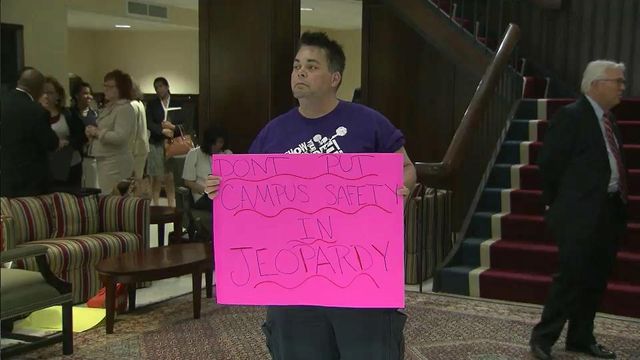UNC system leaders vote to ban gender-neutral housing
Members of the University of North Carolina Board of Governors voted unanimously Friday to outlaw gender-neutral housing facilities on the system's 16 campuses. The decision will force officials at UNC-Chapel Hill to scrap plans they had to offer gender-neutral housing options to students beginning in 2013-14.
Posted — UpdatedStudents can begin moving back to campus Aug. 17, and officials will have to reassign the four students who signed up for the program in a university-owned apartment. If they stay on campus, they will have to live in gender-specific housing.
"The Board of Governors has brought leadership and sanity to the university housing environment," Fitzgerald said in a statement. "With this uniform policy, our public universities and colleges can get back to the business of educating our students and preparing them to be productive members of society instead of promoting co-habitation among students of the opposite sex."
Supporters of the option have said that the move will benefit students – specifically gay, lesbian, bisexual and transgender students – who are being harassed and bullied in traditional on-campus housing.
"It would be more safe and inclusive, and they'd be able to feel a little bit more honest," said Gonzalo Agudela, a former UNC-Charlotte student who was among three protesters who criticized Friday's vote and what they consider a drought of public input on the issue.
"It kind of reinforced those things like these people aren't real, like we don't have to respect their identity and how they choose to identify," protester Romeo Jackson said. "It's important that those voices aren't shut out of the conversation."
Terri Phoenix, director of UNC's LGBTQ Center, said that the gender-specific housing coaltion was not granted an opportunity to address the BOG prior to Friday's vote. A spokeswoman for UNC said that Campus Pride, an external advocacy group that asked for the opportunity to address the board, was allowed to present written remarks for distribution to the board.
Former Chancellor Holden Thorp said after the November vote that allowing gender-neutral housing options was vital to protect the safety of UNC-Chapel Hill students.
Hans said there are other ways to accomplish that goal.
"Our board believes every student should be safe, comfortable and included, but there are more practical accommodations we can make to achieve that," he said.
Nearly 100 colleges nationwide have gender-neutral housing options. Duke University, Warren Wilson College and Guilford College – all private schools – are the only universities in North Carolina to allow gender-neutral housing.
• Credits
Copyright 2024 by Capitol Broadcasting Company. All rights reserved. This material may not be published, broadcast, rewritten or redistributed.





